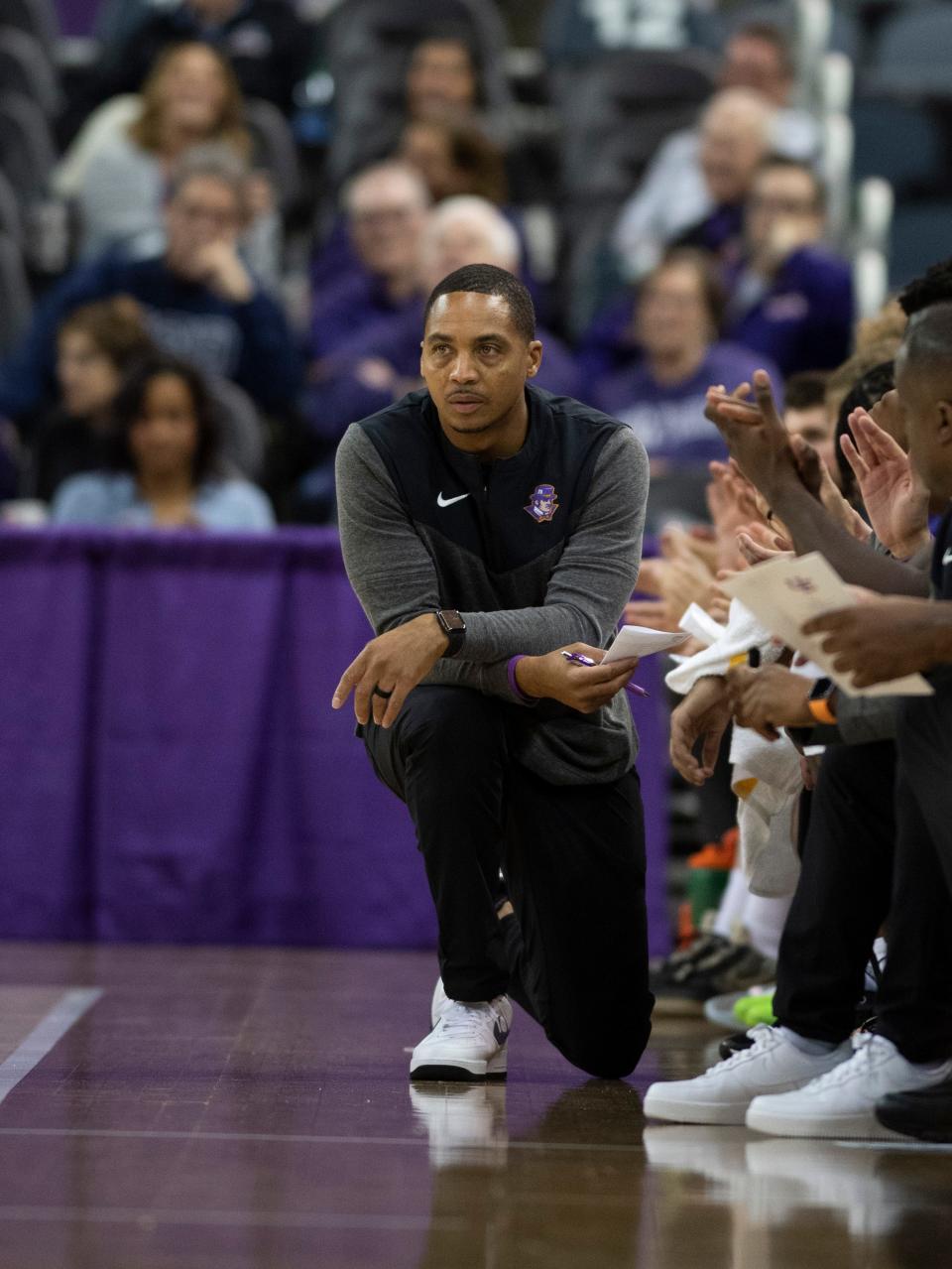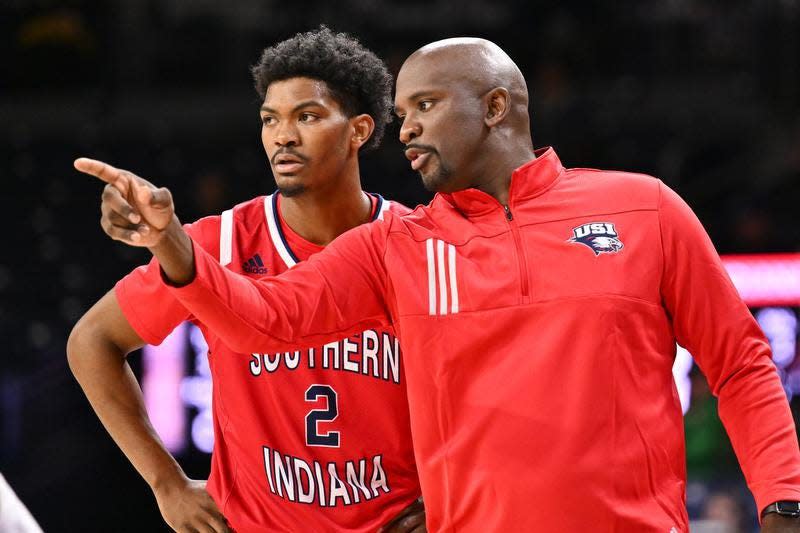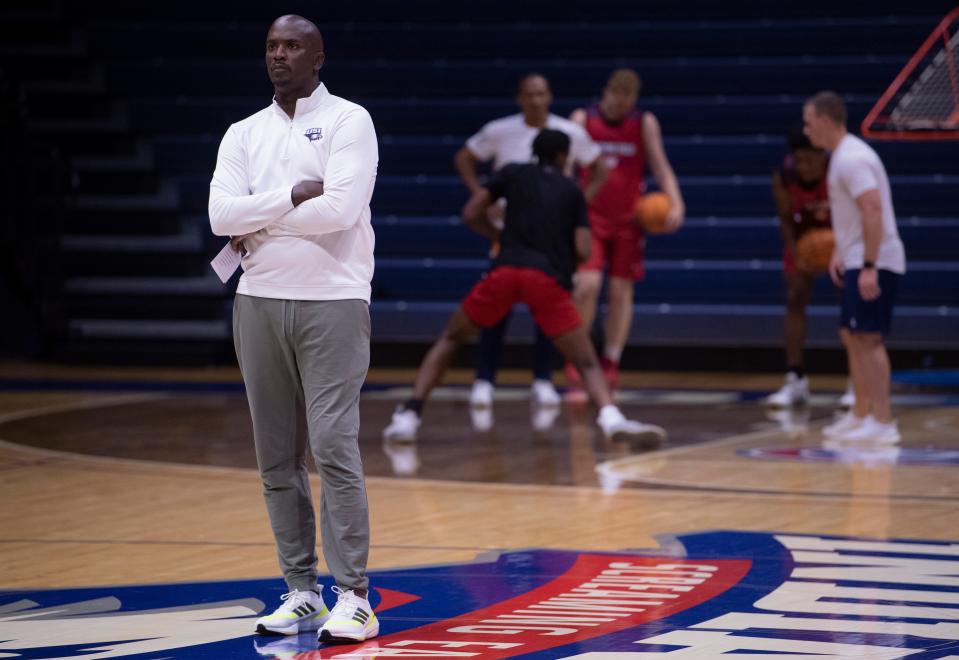David Ragland, Stan Gouard are proud to be Black men's college basketball head coaches
EVANSVILLE — Two head coaches who represent the city of Evansville recently were at Ford Center for a rare moment.
University of Evansville men’s basketball coach David Ragland was on the sidelines, leading his team in a hotly contested Missouri Valley Conference game against Missouri State. University of Southern Indiana coach Stan Gouard was watching from the stands.
Goaurd also coached Ragland at USI during his playing days. They maintain a close relationship, nearly working together in the past and staying in contact over the years.
“I don’t see David enough,” Gouard said. “I’m pulling for David more than anybody knows.”
“He means a lot to me,” Ragland said. “I’m proud of him. … I’ve felt like a family member and he’s living out his dream.”
The pair have remained friends for two decades. They know each other’s families and support each other’s teams. They share the struggles of being Division I men’s basketball coaches. Both have seen their share of change in the industry.
Particularly, Ragland and Gouard have been in the business long enough to see a noticeable increase in Black and minority inclusiveness in college coaching. Black coaches made up 31% of people in those roles in the 2021-22 season, up from 27% in 2020-21. As for their specific institutions, Gouard is the first Black head coach at USI while Ragland is the second at UE.
“When I started coaching 23, 24 years ago, we didn’t see very many African-Americans in leadership roles,” Gouard said. “(We) didn’t think these opportunities were being given to us as easy as they were to others.
“It’s happening more and more in college sports, that number is continuing to increase. That’s something I don’t take lightly.”
Both noted the importance of people who came before them to lead that change of increasing diversity in coaching.

“If those who were getting spit at, called other names, kicked out of gyms, ran out of gyms, wouldn’t have done that and handled it gracefully,” Ragland said, “it doesn’t allow an opportunity for me, sitting where I’m at.
“That’s why it’s right for me to do what needs to be done here for the program, number one, but for those that have done it before.”
For UE guard Marvin Coleman II, seeing the increase in Black coaches in college basketball “shows where we’re going as a society.” A majority of college basketball players are Black, a number that reaches nearly 75% in the NBA, and having that representation means a lot for Coleman and other players.
“Having the diversity of a coach, it just goes to show that we can do anything we set our mind to,” Coleman said. “To have an African-American head coach, it means a lot because it’s like, maybe I can be that one day.
“When you think about guys like LeBron James, there’s kids from the inner city who have no hope and they’re looking at him like, ‘Wow, I could do that.’ There’s probably kids in Evansville that come to our games and they see Coach Rags and they’re like, ‘Man, maybe I could be like him one day.’”
The importance of representation
But why is that representation important?
“There’s great coaches from every background, but I think it’s great that we as a unit have been putting our foot in the door at multiple colleges,” USI guard Tyler Henry said. “I think it’s just amazing that the representation is right here within the city.
“I think it’s really important. It shows that, regardless of the color of your skin, you can be successful. … With them doing so, it helps us want to pursue it and also give back the same way they did or even more. Seeing that is just amazing.”
Will Robinson became the first Black Division I men’s basketball head coach when he was hired by Illinois State in 1970. Black coaching history, in regard to the larger history of college basketball, is relatively new. The first intercollegiate game was held in 1893, less than 20 years after the Civil War ended, and it took another 77 years for a Black coach to get an opportunity.
Now nearly one-third of Division I coaches are Black.
“I guess sometimes you can pinch yourself just for (being a D-I coach), but to be part of the positive trend of minority and Black coaches to be head coaches is even icing on the cake,” Ragland said. “To be able to have that as part of it, the progress we’re making is encouraging and it’s a responsibility that I don’t take lightly.

Gouard was the only Black head coach in the Great Lakes Valley Conference during USI’s final years in Division II. He said that was “very concerning.” He’s seen more representation since making the move to the Ohio Valley Conference with Brian Collins and Tennessee State and Darrell Walker at Little Rock.
“We always said we wanted a fair chance and I think we’re getting those now. It’s happening more and more,” Gouard said. “I think it’s important how I take advantage of the situation so that way I can pave the way for my student-athletes on my current team to get a head coaching job or athletic director role job.”
What makes Evansville a place two Black head coaches can thrive?
Evansville is one of 32 cities home to multiple D-I programs and one of four with a population of 150,000 or fewer people. Not many cities can support more than one top-level athletic institution, and the River City has done both by allowing Gouard and Ragland to achieve success in their roles as Black coaches.
“That doesn’t happen too often and I don’t take that very lightly,” Gouard said. “It’s something I’m proud to see. We’re just trying to pave the way for our youth to see that there is opportunity for you if you go about things the right way: Work hard, treat people fairly, never burn bridges and don’t give up on your dreams.
“I think that’s something that’s easy to do as young Black males because there’s so many doors.”
UE and USI: Evansville is one of America's smallest markets with two Division I schools. Can it work?
Ragland said Evansville has “evolved a ton” over the years to allow for people — whether they’re “Black, white, pink, purple, gray,” he noted — to have professional opportunities.
“To have two Division I programs in our city, that’s our community evolving within itself. To have two Black head coaches at both universities is also encouraging,” Ragland said. “We can all work together to make the University of Evansville, the University of Southern Indiana and the community of Evansville just a well-rounded, thriving city.
“I think it says a lot about Evansville and our community and the trajectory of our city. I think it’s trending in the right direction. It’s very encouraging and exciting.”
“That’s the beauty of Evansville,” Gouard added. “I thought the community has got behind both coaches and made sure we had everything we need from their standpoint to be successful.”
Ragland and Gouard both talk about the importance of having each other just down the road.
“I know he’s going to continue moving that program in the right direction,” Ragland said. “We have plenty of people supporting myself and my family to make sure that this program continues to move in the right direction. To see both programs, at the same time, start to move forward and going to grow and be successful in both conferences, it says a lot about our community and both universities.”

Networking and support are crucial
Gouard and Ragland are both members of organizations for Black coaches.
Gouard mentioned he was in a group chat with Seton Hall coach Shaheen Holloway and other Black coaches across the country. He said it's great networking as he gets to know other coaches as they bounce ideas off one another.
“We talk about everything,” Gouard said. “I think the important thing for me is some guys see it from my perspective as an African-American coach. … It’s a fun group.”
Both said it was important to have that network of people who provide positive support and professional development. Not only does having that group help as a coach, but also “as a husband and a father and a mentor,” Ragland said. Former Butler coach LaVall Jordan, Marquette coach Shaka Smart and Missouri coach Dennis Gates were among the names Ragland and Gouard mentioned who have been involved.
“Being part of a brotherhood like that is always good because, as we continue to fight and push and pour in positivity and encouragement to our group, we also need that,” Ragland said. “The list goes on and on of people I can name. … It’s just positive, keeping focus on what the most important part of our job is, and that’s helping young men become better people.”
Continuing progress and improvements

Though there have been continuous improvements in the coaching landscape, there’s still room for more to be done.
“To get called a name, or kicked out of gyms, or stuff thrown at you or banned because of the color of your skin or because you look different or talk different, that’s way tougher than what we may be going through right now,” Ragland said. “I acknowledge that and I’m thankful for it — those that have come before me that have handled those situations and were able to push through them to allow myself an opportunity or Stan an opportunity.
“I know that we can make improvements, but I know that we’ve come a long way.”
Gouard wanted to be an athletic director before he got into coaching. He said he wants to see more African-American administrators in roles like that.
“That’s a need,” Gouard said. “I would love to see more administrators. I think it’s a job anybody could do a great job at, but it would be great to look across some time and see some people of color in those roles.”
Ragland’s family has lived in Evansville for generations and has been involved in the community for as long as he can remember. He recognizes the challenges of being a coach, a role he’s held for 18 years, and is thankful to be somewhere he knows while also thanking those who paved the way for him.
“It’s so humbling and it’s eye-opening,” Ragland said. “It really drives me to respond to the responsibility the right way.”
Ragland and Gouard talk about the importance of their roles and what it means to them to be where they are. Gouard said he is setting an example for his family. He has cousins and nephews who coach at the high school level and he said he thinks they “can go after coaching.”
“To see those young guys in my family coach, it’s a blessing,” Gouard said. “Also the young men that I coach as well, whether you’re Black or white, I just love seeing guys grow into young men. I love being a part of that.”
This article originally appeared on Evansville Courier & Press: David Ragland, Stan Gouard on diversity among college coaches

